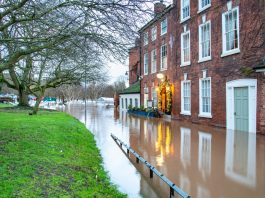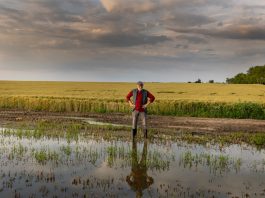Innovative approaches to flood and coastal resilience taken by the Environment Agency, local authorities and local partners are helping to unlock significant wider social, economic and environmental benefits for people, places, and wildlife.
Today, the Environment Agency published its mid-programme report for its £200m Flood and Coastal Innovation Programmes.
The report details what has been achieved so far and the lessons learned, such as:
- 97 new natural flood management schemes delivered, using natural processes to slow the flow of floodwaters through techniques such as leaky dams, wetland ponds and enhanced marine habitats.
- Almost 600 new monitoring sensors nationwide to measure river levels and provide accurate and timely warnings ahead of flooding.
- 25 PhD positions funded to train the next generation of flood experts and develop new approaches to climate change and extreme weather challenges.
Combatting climate change through flood and coastal resilience
The impacts of climate change are already being seen here in the UK and worldwide. Rising sea levels and more extreme weather will likely lead to more frequent and severe flooding and storm surges.
This is why the Environment Agency is now encouraging innovation in flood and coastal resilience.
Julie Foley, Director of Flood Risk Strategy & National Adaptation at the Environment Agency, commented: “We need to combat climate change through innovation.
“That is the very reason why we established the £200m Flood and Coastal Innovation Programmes.
“The 35 projects are already delivering social, economic and environmental benefits for people and wildlife, which is hugely encouraging.”
The programmes support innovative action across the UK
Some examples of individual flood and coastal resilience initiatives supported through these programmes include:
- The Action for Silk Stream project team in Watling Park in the London Borough of Barnet has partnered with the police to align its sensitive landscape design with public realm improvements. The aim is not only to reduce flood risk but also to create safer and more accessible public spaces by tackling anti-social behaviour and crimes, especially those against women.
- Elsewhere, the Resilient Roch project in Rochdale combines property flood resilience and energy efficiency measures to retrofit social housing targeted at disadvantaged communities in Littleborough and Wardleworth. The local authority has aligned funding from a package of energy efficiency measures of around £3m with Ovo Energy to provide practical flood resilience and energy efficiency advice, helping to boost resilience and save money for householders.
The projects have also found ways of maximising the benefits of nature-based solutions to deliver wider benefits to the environment and support the local economy by using nature to safeguard tourism and enable new industries.
In South Tyneside, the Stronger Shores team embraces nature-based solutions by establishing seagrass meadows, kelp forests, and oyster reefs. In certain conditions, kelp forests can lower wave energy by up to 50%, reducing the erosive power of wave action at the shore.
The team is partnering with academia to understand how such measures can reduce coastal erosion and deliver local economic benefits from an improved marine environment.
The £200m fund was launched in 2020 to meet the aims of the Environment Agency’s Flood and Coastal Erosion Risk Management (FCERM) Strategy for England.





